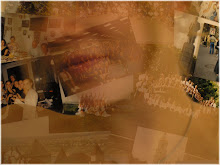
When I was reading, Scarcity or Abundance? Preserving the Past in a Digital Era, by Roy Rosenzweig, I began to think about some of the reasons why not all historians are interested in learning about the digital world, which led me to ask myself some questions (many of which were brought up in class today, but I wanted to write about it in any case).
I wondered why it is so difficult for historians to accept the idea that we may be able to preserve all sorts of information on the World Wide Web. That our research could become easily accessible simply by signing onto the internet.
When I think of doing research, I picture libraries and archives, full of dusty old books. I picture sitting through the night in old buildings that one can image are haunted (well at least I do). There is a certain image I associate with conducting historical research that I think actually inspires historians. Those settings almost make us want to do our research. It is not easy work, actually it can be quite tedious, but I know I have enjoyed sitting for hours looking through books at the library or at home. I can get caught up sitting on the floor with tons of books surrounding me and in a way it makes me feel important because I realize I am looking at something of great significance.
Conducting research on my computer does not give me that same feeling. Writing I can do on my computer, because I can write my thoughts and ideas quickly on the topic at hand. But to do research also on my computer almost makes me feel confined and claustrophobic. Like I am attached to this piece of machinery and I feel at times very fidgety. Not being able to physically hold the book, but look at it through the window of my computer, just doesn’t do it for me.
I can understand why the idea of putting all of the world’s information on the net would be an exciting notion. But with doing research through the internet, will historians produce better quality work? Because won’t the attachment to things old be lost because we are looking at it through a modern medium, making it more difficult for historians to produce inspired work?
The reason I have thought of this, is because this past year I read two novels, The Historian by Elizabeth Kostova and The Thirteenth Tale by Diane Setterfield. The reason I chose to read these books was because it involved characters doing research in old dusty archives and libraries late at night, and I wanted to be drawn into that world; to be in Europe in historic buildings, looking at old smelly books. The libraries of the two universities I have attended were not in historic buildings and I always wished they were. Still, just being in a library where there are shelves and shelves of books, holding them, sifting through them, got me excited. I would take out 20 books at a time to research my essays and would sit for hours by my electric fireplace (again wishing it was a wood burning one, but what can you do?), holding a cup of tea in my hand, with a lamp over my head, the snow falling outside, wind howling, and me reading.
In the program I am in now, most of my readings are online and I am finding it somewhat difficult. For my Digital History class it makes sense to read about the internet on the internet. Even my Public History class itself. But when it comes to taking a history class on a particular war or period, I like the idea of going to the library and sitting with an actual book.
In any case, what I am trying to say is that I can understand why historians are having a difficult time thinking that one day they will be doing all their research on the internet, at least I know I do. Many historians probably got into the profession in order to immerse themselves in all things old as a way of having a break, in a sense, from our present day modern society.
However, the reality of it is somewhat different. More and more people are depending on the internet, and I am going to say, it is still in combination with books. Books still play a very important role in our society, but so does the internet. As historians I think we care about reaching as many people as we can, and the way to do that these days is through the internet. Therefore, I think we need to find a balance between the old and the new.
Here is some food for thought (I thought about this after my class today).
When I interviewed the famine survivor I conducted the interview in Ukrainian. If I had known no Ukrainian and would have had to hire an interpreter, I would not have had the same experience. There was a connection between me and the person I interviewed because I could personally communicate with them (even if my Ukrainian language was not at the same level).
I think that when dealing with technology, it is better to somewhat understand the language, then to be completely uneducated in it. It will make your experience as a historian in this day and age a more successful one.
Besides, the more languages you know the better – isn’t that what they say?
Question: I have decided to edit my question for this posting. Since many of us in our Public History class have shown a definate love for books, I would like to hear what sort of books you would recommend?
I highly recommend the two books I mention in my posting.
.jpg)

